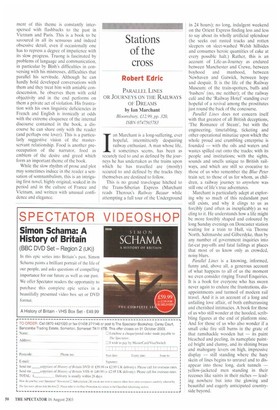Stations of the cross
Robert Edric
PARALLEL LINES OR JOURNEYS ON THE RAILWAYS OF DREAMS by Ian Marchant Bloomsbury, £12.99, pp. 320, ISBN 0747565783 1 an Marchant is a long-suffering, ever hopeful, intermittently despairing railway enthusiast. A man whose life, it sometimes seems, has been as securely tied to and as defined by the journeys he has undertaken as the trains upon which he has travelled are (mostly) secured to and defined by the tracks they themselves are destined to follow.
This is no grand travelogue hitched to the Trans-Siberian Express (Marchant reads Theroux's Railway Bazaar while attempting a full tour of the Underground
in 24 hours); no long, indulgent weekend on the Orient Express finding less and less to say about its wholly artificial splendour (he seeks out rusted tracks and rotten sleepers on sleet-washed Welsh hillsides and consumes heroic quantities of cake at every possible halt.) Rather, this is an account of Life-as-Journey as endured between Manchester and Crewe, between boyhood and manhood, between Newhaven and Gatwick, between hope and despair. It is the life of the Railway Museum; of the train-spotters, buffs and 'bashers' (no, me neither); of the railway café and the 'Railway Hotel' standing ever hopeful of a revival among the prostitutes just round the back of the concourse.
Parallel Lines does not concern itself with that greatest of all British deceptions, 'The Romance of Steam', but with the engineering, timetabling, ticketing and other operational minutiae upon which the whole proud and crumbling enterprise is founded — with the oils and waters and wastes spilled out onto the tracks; with its people and institutions; with the sights, sounds and smells unique to British railways, and which are still so evocative to those of us who remember the Blue Peter train set; to those of us for whom, as children, a railway journey to anywhere was still one of life's true adventures.
Marchant is particularly adept at exploring why so much of this redundant past still exists, and why it clings to us as forcibly (and often as inexplicably) as we cling to it. He understands how a life might be more forcibly shaped and coloured by long Sunday evenings on Doncaster station waiting for a train to Hull, via Thorne North, Saltmarshe and Gilberdyke, than by any number of government inquiries into fat-cat pay-offs and fatal failings at places that most of us know only as crowded, noisy blurs.
Parallel Lines is a knowing, informed, funny and, above all, a generous account of what happens to all of us the moment we even consider ringing Travel Enquiries. It is a book for everyone who has sworn never again to endure the frustrations, disappointments and turmoil of modern rail travel. And it is an account of a long and unfailing love affair, of both embarrassing and cherished intimacies. A book for those of us who still wonder at the hooded, scribbling figures at the end of platform nine. And for those of us who also wonder if a small coke fire still burns in the grate of that ramshackle wooden hut — its paint bleached and peeling, its nameplate painted bright and clumsy, and its shining brass and mahogany levers on high, impressive display — still standing where the hazy skein of lines begins to unravel and to disappear into those long, dark tunnels — yellow-jacketed men standing in their recesses like saints in their niches — leading nowhere but into the glowing and beautiful and eagerly anticipated countryside beyond.










































































 Previous page
Previous page